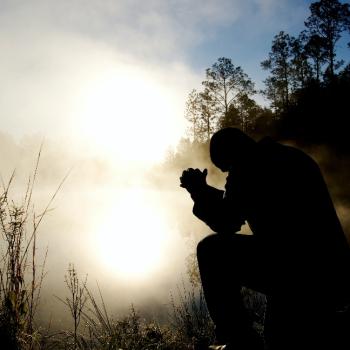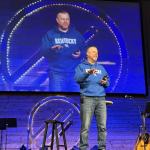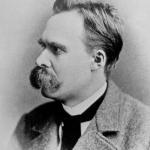How to Engage in a Spiritual Reset
John 21:15-19 How to Engage in a Spiritual Reset (Reset – Part 3)
Discipleship is the continued process of loving Jesus. Christian discipleship starts with the knowledge that Jesus loves you. Christian discipleship continues with the experience of obeying Jesus because you love Him.
Friedrich Nietzsche, no friend of the Christian faith, has stated: “The essential thing ‘in heaven and earth’ is…that there should be long obedience in the same direction; there thereby results, and has always resulted in the long run, something which has made life worth living.”1
THE FIVE STAGES OF CHRISTIAN PERSONAL GROWTH2
1. Learning Stage – Personal discipleship – “do you love more than these?” (John 21:15)
“When they had eaten breakfast, Jesus asked Simon Peter, “Simon, son of John, do you love me more than these?”… (John 21:15, CSB)
Jesus asked a very personal question to Peter. He asked Peter if Peter loved Jesus more than “these.” To what “these” is Jesus referring? Jesus could have referred to the love of the other disciples. He could also be referring to the fish he just caught. He could also be referring to the boat and the business. I believe that Jesus was pointing to the fish that he was cooking and asking if Peter loved Jesus more than the fish. The reason is that Jesus was comparing the love of Jesus to following Peter’s own way of life.
When it comes to following Jesus, we have to grow in loving Him more than what we have loved before. The learning stage is all about personal discipleship. During this first stage of renewing your personal discipleship with Jesus, a Christian goes back to the basics of loving Jesus more than anything else. After Peter affirms that he loves Jesus, Jesus steps up the call of discipleship. This leads to the second stage of personal discipleship.
2. Lending Stage – Make disciples – “Feed my lambs” (John 21:15)
…“Feed my lambs,” he told him.” (John 21:15, CSB)
Here, Jesus says to feed lambs. Lambs are young sheep. They are not fully grown sheep. They are child sheep. Jesus instructs Peter to make disciples. This is related to the commission Jesus gave the entire group in Matthew.
“Go, therefore, and make disciples of all nations, baptizing them in the name of the Father and of the Son and of the Holy Spirit,” (Matthew 28:19, CSB)
We are told here that we are to make disciples, which is the main action in this text. This is the same as “feed my lambs” in John. You go from learning for yourself to helping someone else grow. You lend out what you have learned.
But it does not end there.
Each time, Jesus asks Peter if Peter loves Jesus. The question about the love of Jesus is central to how discipleship works. Discipleship is not just about learning. It is about loving. So, one can learn to love Jesus. One can learn to love younger people in the faith. That’s relatively easy. They don’t know as much as you. You don’t know as much as Jesus. You pass on what you learn from Jesus to the lamb.
People make a big deal that the word love changes in the Greek here in these verses. It goes from sacrificial love to brotherly love and back to sacrificial love. Yet, that is not the focus of Peter’s disappointment. Peter is thus upset, not because Jesus has changed the verb for love, but because Jesus has asked him the same question for the third time.3
It is at this point, we need to see that discipleship takes a level of deeper faith and love than we originally thought. It is here where most Christians get stuck. They want someone else to teach them. But they rarely want to take the responsibility that discipleship requires.
3. Leading Stage – “shepherd my sheep” (John 21:16)
“A second time he asked him, “Simon, son of John, do you love me?” “Yes, Lord,” he said to him, “you know that I love you.” “Shepherd my sheep,” he told him.” (John 21:16, CSB)
Here you go from learning to lending, to actually leading. The young lambs you have taught now need a leader, not just a teacher. They need someone who will help them go from consuming to contributing. Jesus wanted Peter to lead the church to grow larger. At this stage, you are helping the church to go from just learning things in their Sunday School books to participating in the mission of the church. It is here that some people will balk. You know it because you will hear that “they are not being fed.”
At this stage of discipleship, you have gone from learning, to lending, to leading. You should have a group of people who are discipling behind you.
“What you have heard from me in the presence of many witnesses, commit to faithful men who will be able to teach others also.” (2 Timothy 2:2, CSB)
Peter later defined shepherding as supervisor position. He also said that the position should be approached with the right attitude. A shepherd should oversee with joy.
“Shepherd God’s flock among you, not overseeing out of compulsion but willingly, as God would have you; not out of greed for money but eagerly;” (1 Peter 5:2, CSB)
There should be people who are not just learning, but are lending out to others. Then comes the point of discipleship where you learn a hard lesson.
4. Letting Go Stage – “feed my sheep” (John 21:17)
“He asked him the third time, “Simon, son of John, do you love me?” Peter was grieved that he asked him the third time, “Do you love me?” He said, “Lord, you know everything; you know that I love you.” “Feed my sheep,” Jesus said.” (John 21:17, CSB)
What is the difference between feeding lambs and feeding sheep? A big difference. You have to start to let go. You go from leading people to letting them lead themselves. Feeding sheep is much different than feeding lambs. Let me explain with a cattle illustration.
If you have a calf in which the mother doesn’t take, you have to bottle feed it. So you spend lots of time feeding it milk by hand. There is no mother to take the calf and so you help it grow. Eventually, you have to let the calf be “weaned.” This means that the calf learns to grow on its own. A dependent Christian has to become a growing Christian who can eventually become an independent Christian. That can only happen when a mature Christian who has been discipling another Christian lets go so that the immature Christian can grow. A lamb has to stand on its own to grow and become a sheep. A lamb becomes a sheep when it leaves its mother and lives life on its own. The same is true for the Christian.
5. Living Stage – Follow Jesus – “follow me.” (John 21:18-19)
““Truly I tell you, when you were younger, you would tie your belt and walk wherever you wanted. But when you grow old, you will stretch out your hands and someone else will tie you and carry you where you don’t want to go.” He said this to indicate by what kind of death Peter would glorify God. After saying this, he told him, “Follow me.”” (John 21:18–19, CSB)
Ultimately, loving Jesus means that you follow Him wherever He tells you to go. It means rising above the learning stage, the lending stage, the leading stage, the letting go stage, to finally the living stage. You live the life that Jesus calls for you. My personal discipleship will take me to further levels of obedience. Jesus said in Mark about the way that discipleship works:
“Calling the crowd along with his disciples, he said to them, “If anyone wants to follow after me, let him deny himself, take up his cross, and follow me.” (Mark 8:34, CSB)
Discipleship is a growth process where continue to give up more of me and take on more of what Jesus wants of me. Jesus shared a prophecy with Peter. Jesus said that Peter would be crucified. He said that Peter needs to follow Jesus. That is the final stage of personal discipleship. You go from learning to living. As your love for Jesus increase, so does your life for Jesus increase. You give up more of yourself and you accept more of what Jesus expects. All the while, you are passing down lessons to others.
In Peter’s case he moves from being responsible for ten other disciples to leading a church that eventually grows to thousands. He went from there to start other churches. The call to discipleship deepened. Discipleship is a long process of obedience, from personal growth to continued growth of the kingdom of God.
Jesus Christ is transforming lives today. Wherever He finds a believer who is willing to yield to His will, listen to His Word, and follow His way, He begins to transform that believer and accomplish remarkable things in that life. He also begins to do wonderful things through that life.4
1 Friedrich Nietzsche, Beyond Good and Evil, trans. Helen Zimmern (London: 1907), sec. 188. Found in “Long Obedience,” https://www.circleofhope.net/rodwhite/long-obedience/.
2 Jim Erwin, “The 5 Stages of Personal Discipleship,” John 21:15-19, 19 July 2017, Simple Thoughts Reflections (2016-2017), Logos Bible Software, Internet, Patheos, http://www.patheos.com/blogs/jimerwin/2017/07/19/5-stages-personal-discipleship/, accessed on 18 August 2017.
3 Gary M. Burge, John, The NIV Application Commentary (Grand Rapids, MI: Zondervan Publishing House, 2000), 588.
4 Warren W. Wiersbe, The Bible Exposition Commentary, vol. 1 (Wheaton, IL: Victor Books, 1996), 400.
Photo by Joshua Earle on Unsplash














